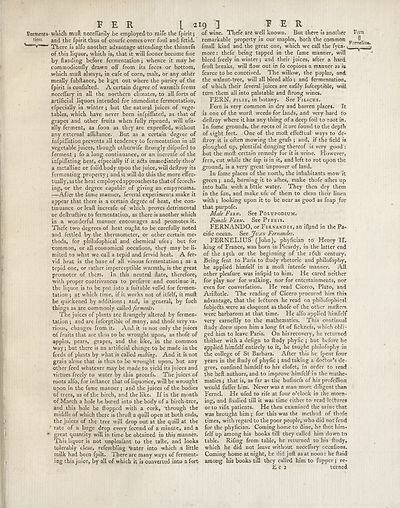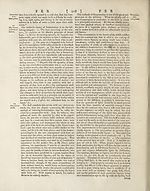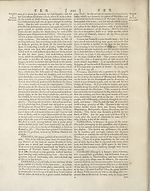Encyclopaedia Britannica > Volume 7, ETM-GOA
(241) Page 219
Download files
Complete book:
Individual page:
Thumbnail gallery: Grid view | List view

PER L *
Fermenta- wliicK mud necefTarily be employed to raife the fpirit;
ti°n. an(j the fpirk thus, of courfe comes over foul and fetid.
There is alfo another advantage attending the thinnefs
of this- liquor, which is, that it will foorter become tine
by handing before fermentation; whence it may be
commodioufly drawn off from its feces or bottom,
which muft always, in cafe of corn, malt, or any other
meally fubftance, be kjpt out where the purity of the
fpirit is confulted. A certain degree of warmth feems
neceflary in all the northern climates, to all forts of
artificial liquors intended for immediate fermentation,
efpecially in winter; but the natural juices of vege¬
tables, which have never been infpiffated, as that of
grapes' and other fruits when fully ripened, will ufu-
ally ferment, as foon as they are expreffed, without
any external affiltance. But as a certain degree of
infpifiation prevents all tendency to fermentation in all
vegetable juices, though otherwife ftrongly difpofed to
ferment ; fo a long continuance, or an increafe of the
infpiffating heat, efpecially if it afts immediately thro’
a metalline or folidbody upon the juice, will deftroy its
fermenting property j and it will do this the more effec¬
tually, as the heat employedapproachesto that of fcorch-
ing., or the degree capable of giving an empyreumai.
—After the fame manner, feveral experiments make it
appear that there is a certain degree of heat, the con¬
tinuance or leaft increafe of which proves detrimental
or deftruftive to fermentation, as there is another which
in a wonderful manner encourages and promotes it.
Thefe two degrees of heat ought to be carefully noted
and fettled by the thermometer, or other certain me¬
thods, for philofophical and chemical ufes; but for
common, or all economical occafions, they may be li¬
mited to what we call a tepid and fervid heat. A fer¬
vid heat is the bane of all vinous fermentation $ as a
tepid one, or rather imperceptible warmth, is the great
promoter of them. In this neutral ilate, therefore,
with proper contrivances to preferve and continue it,
the liquor is to be put into a fuitable veffel for fermen¬
tation ; at which time, if it works not of itfelf, it muft
be quickened by additions; and, in general, by fuch
things as are commonly called ferments.
The juices of plants are ftrangely altered by fermen¬
tation ; and are fufceptible of many, and thofe very va¬
rious, changes from it. And it is not only the juices
of fruits that are thus to be wrought upon, as thofe of
apples, pears, grapes, and the like, in the common
way; but there is an artificial change to be made in the
feeds of plants by what is called making. And it is not
grain alone that is thus to be wrought Upon, but any
other feed whatever may be made to yield its juices and
virtues freely to water by this proctfs. The juices of
roots alfo, for inllance that of liquorice, will be wrought
upon in the fame manner; and the juices of the bodies
of trees, as of the birch, and the like- If in the month
of March a hole be bored into the body of a birch-tree,
and this hole be flopped with a cork, 'through the
middle of which there is thruft a quill open at both ends,
the juices of the tree will drop out at the quill at the
‘ rate of a large drop every fecond of a minute, and a
* great quantity will in time be obtained in this manner.
This liquor is not unpleafant to the tafte, and looks
tolerably clear, refembling Water into which a little
milk had been fpilt. There are many ways of ferment¬
ing this juice, by all of which it is converted into a fort
t9 ] F E R
of wine. Thefe are well known. But there is another Pern
remarkable property in our maples, both the common p
fmall kind and the great one, which we call the fyca-. ^ 1
more: thefe being tapped in the fame manner, will
bleed freely in winter; and their juices, after a hard
froft breaks, will flow out in fo copious a manner as is
fcarce to be conceived. The willow, the poplar, and
the walnut-tree, will all bleed alfo ; and fermentation,
of which their feveral juices are eafily fufceptible, will
turn them all into palatable and ftrong wines.
FERN, filix, in botany. See Filices.
Fern is very common in dry and barren places. It
is one of the word weeds for lands, and very hard to
deftroy where it has any thing of a deep foil to root in.
In fame grounds, the roots of it are found to the depth
of tight feet. One of the moft effe&ual ways to de¬
ftroy it is often mowing the grafs ; and, if the field is
ploughed up, plentiful dunging thereof is very good :
but the moft; certain remedy for it is urine. However,
fern, cut while the fap is in it, and left to rot upon the
ground, is a very great improver of land.
In fome places of the north, the inhabitants mow it
green ; and, burning it to afties, make thofe allies up
into balls with a little water. They then dry them
in the fun, and make ufe of them to clean their linen
with; looking upon it to be near as good as foap for
that purpofe,
Male Fern. See Polypodium.
Female Fern. See Pteris.
FERNANDO, or Fernandes, an iflpnd in the Pa¬
cific ocean. See Juan Fernandes.
FERNELIUS (John), phyfician to Henry II.
king of France, was born in Picardy, in the latter end
of the 15th or the beginning of the 16th century.
Being fent to Paris to ftudy rhetoric and philofophy,
he applied himfelf in a moft intenfe manner. All
other pleafure was infipid to him. He cared neither
for play nor for walking, nor for entertainments, nof
even for converfation. He read Cicero, Plato, and
Ariftotle. The reading of Cicero procured him this
advantage, that the ledhires he read on philofophical
fubje&s were as eloquent as thofe of the other mafters
were barbarous at that time. He alfo applied himfelf
very earneftly to the mathematics. This continual
ftudy drew upon him a long fit of ficknefs, which obli¬
ged him to leave Paris. On his recovery, he returned
thither with a defign to ftudy phyfic ; but before he
applied himfelf entirely to it, he taught philofophy in
the college of St Barbara. After this he fpent four
years in the ftudy of phyfic ; and taking a doflor’s de¬
gree, confined himfelf to his clofet, in order to read
the heft authors, and to improve himfelf in the mathe¬
matics; that is, as far as the bufinefs of his profeflion
would fuffer him. Never was a man more diligent than
Femel. He ufed to rife at four o’clock in the morn¬
ing, and ftudied till it was time either to read ledlures
or to vifit patients. He then examined the urine that
was brought him ; for this was the method of thofe
times, with regard to the poor people, who did not fend
for the phyfician. Coming home to dine, he {hut him¬
felf up among his books till they called him down to
table. Rifing from table, he returned to his ftudy,
which he did not leave without neceffary occafions.
Coming home at night, he did juft as at noon: he ftaid
among his books till they called him to fupper; re-
E e 2 turned
Fermenta- wliicK mud necefTarily be employed to raife the fpirit;
ti°n. an(j the fpirk thus, of courfe comes over foul and fetid.
There is alfo another advantage attending the thinnefs
of this- liquor, which is, that it will foorter become tine
by handing before fermentation; whence it may be
commodioufly drawn off from its feces or bottom,
which muft always, in cafe of corn, malt, or any other
meally fubftance, be kjpt out where the purity of the
fpirit is confulted. A certain degree of warmth feems
neceflary in all the northern climates, to all forts of
artificial liquors intended for immediate fermentation,
efpecially in winter; but the natural juices of vege¬
tables, which have never been infpiffated, as that of
grapes' and other fruits when fully ripened, will ufu-
ally ferment, as foon as they are expreffed, without
any external affiltance. But as a certain degree of
infpifiation prevents all tendency to fermentation in all
vegetable juices, though otherwife ftrongly difpofed to
ferment ; fo a long continuance, or an increafe of the
infpiffating heat, efpecially if it afts immediately thro’
a metalline or folidbody upon the juice, will deftroy its
fermenting property j and it will do this the more effec¬
tually, as the heat employedapproachesto that of fcorch-
ing., or the degree capable of giving an empyreumai.
—After the fame manner, feveral experiments make it
appear that there is a certain degree of heat, the con¬
tinuance or leaft increafe of which proves detrimental
or deftruftive to fermentation, as there is another which
in a wonderful manner encourages and promotes it.
Thefe two degrees of heat ought to be carefully noted
and fettled by the thermometer, or other certain me¬
thods, for philofophical and chemical ufes; but for
common, or all economical occafions, they may be li¬
mited to what we call a tepid and fervid heat. A fer¬
vid heat is the bane of all vinous fermentation $ as a
tepid one, or rather imperceptible warmth, is the great
promoter of them. In this neutral ilate, therefore,
with proper contrivances to preferve and continue it,
the liquor is to be put into a fuitable veffel for fermen¬
tation ; at which time, if it works not of itfelf, it muft
be quickened by additions; and, in general, by fuch
things as are commonly called ferments.
The juices of plants are ftrangely altered by fermen¬
tation ; and are fufceptible of many, and thofe very va¬
rious, changes from it. And it is not only the juices
of fruits that are thus to be wrought upon, as thofe of
apples, pears, grapes, and the like, in the common
way; but there is an artificial change to be made in the
feeds of plants by what is called making. And it is not
grain alone that is thus to be wrought Upon, but any
other feed whatever may be made to yield its juices and
virtues freely to water by this proctfs. The juices of
roots alfo, for inllance that of liquorice, will be wrought
upon in the fame manner; and the juices of the bodies
of trees, as of the birch, and the like- If in the month
of March a hole be bored into the body of a birch-tree,
and this hole be flopped with a cork, 'through the
middle of which there is thruft a quill open at both ends,
the juices of the tree will drop out at the quill at the
‘ rate of a large drop every fecond of a minute, and a
* great quantity will in time be obtained in this manner.
This liquor is not unpleafant to the tafte, and looks
tolerably clear, refembling Water into which a little
milk had been fpilt. There are many ways of ferment¬
ing this juice, by all of which it is converted into a fort
t9 ] F E R
of wine. Thefe are well known. But there is another Pern
remarkable property in our maples, both the common p
fmall kind and the great one, which we call the fyca-. ^ 1
more: thefe being tapped in the fame manner, will
bleed freely in winter; and their juices, after a hard
froft breaks, will flow out in fo copious a manner as is
fcarce to be conceived. The willow, the poplar, and
the walnut-tree, will all bleed alfo ; and fermentation,
of which their feveral juices are eafily fufceptible, will
turn them all into palatable and ftrong wines.
FERN, filix, in botany. See Filices.
Fern is very common in dry and barren places. It
is one of the word weeds for lands, and very hard to
deftroy where it has any thing of a deep foil to root in.
In fame grounds, the roots of it are found to the depth
of tight feet. One of the moft effe&ual ways to de¬
ftroy it is often mowing the grafs ; and, if the field is
ploughed up, plentiful dunging thereof is very good :
but the moft; certain remedy for it is urine. However,
fern, cut while the fap is in it, and left to rot upon the
ground, is a very great improver of land.
In fome places of the north, the inhabitants mow it
green ; and, burning it to afties, make thofe allies up
into balls with a little water. They then dry them
in the fun, and make ufe of them to clean their linen
with; looking upon it to be near as good as foap for
that purpofe,
Male Fern. See Polypodium.
Female Fern. See Pteris.
FERNANDO, or Fernandes, an iflpnd in the Pa¬
cific ocean. See Juan Fernandes.
FERNELIUS (John), phyfician to Henry II.
king of France, was born in Picardy, in the latter end
of the 15th or the beginning of the 16th century.
Being fent to Paris to ftudy rhetoric and philofophy,
he applied himfelf in a moft intenfe manner. All
other pleafure was infipid to him. He cared neither
for play nor for walking, nor for entertainments, nof
even for converfation. He read Cicero, Plato, and
Ariftotle. The reading of Cicero procured him this
advantage, that the ledhires he read on philofophical
fubje&s were as eloquent as thofe of the other mafters
were barbarous at that time. He alfo applied himfelf
very earneftly to the mathematics. This continual
ftudy drew upon him a long fit of ficknefs, which obli¬
ged him to leave Paris. On his recovery, he returned
thither with a defign to ftudy phyfic ; but before he
applied himfelf entirely to it, he taught philofophy in
the college of St Barbara. After this he fpent four
years in the ftudy of phyfic ; and taking a doflor’s de¬
gree, confined himfelf to his clofet, in order to read
the heft authors, and to improve himfelf in the mathe¬
matics; that is, as far as the bufinefs of his profeflion
would fuffer him. Never was a man more diligent than
Femel. He ufed to rife at four o’clock in the morn¬
ing, and ftudied till it was time either to read ledlures
or to vifit patients. He then examined the urine that
was brought him ; for this was the method of thofe
times, with regard to the poor people, who did not fend
for the phyfician. Coming home to dine, he {hut him¬
felf up among his books till they called him down to
table. Rifing from table, he returned to his ftudy,
which he did not leave without neceffary occafions.
Coming home at night, he did juft as at noon: he ftaid
among his books till they called him to fupper; re-
E e 2 turned
Set display mode to:
![]() Universal Viewer |
Universal Viewer | ![]() Mirador |
Large image | Transcription
Mirador |
Large image | Transcription
Images and transcriptions on this page, including medium image downloads, may be used under the Creative Commons Attribution 4.0 International Licence unless otherwise stated. ![]()
| Encyclopaedia Britannica > Encyclopaedia Britannica > Volume 7, ETM-GOA > (241) Page 219 |
|---|
| Permanent URL | https://digital.nls.uk/189124362 |
|---|
| Attribution and copyright: |
|
|---|
| Description | Ten editions of 'Encyclopaedia Britannica', issued from 1768-1903, in 231 volumes. Originally issued in 100 weekly parts (3 volumes) between 1768 and 1771 by publishers: Colin Macfarquhar and Andrew Bell (Edinburgh); editor: William Smellie: engraver: Andrew Bell. Expanded editions in the 19th century featured more volumes and contributions from leading experts in their fields. Managed and published in Edinburgh up to the 9th edition (25 volumes, from 1875-1889); the 10th edition (1902-1903) re-issued the 9th edition, with 11 supplementary volumes. |
|---|---|
| Additional NLS resources: |
|

